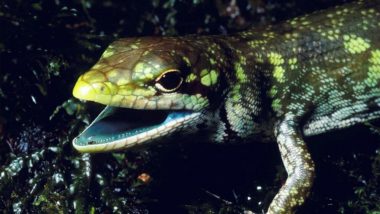Too many people, lizards are bizarre-looking creatures. Individuals consider them frightening because of their seemingly expressionless faces. Lizards feature a tremendous variety in colour, appearance and size and comprises of many different families. But researchers discovered something odd in New Guinea’s Prasinohaema lizards. Six species bleed lime green! Yes, the muscles, bones and tongues of these lizards appear bright, lime-green because of large doses of a green bile pigment, which is poisonous enough and causes jaundice in humans. It would even kill a human 40 times over.
A blood that is so toxic, these reptiles are perfectly healthy. The study was published in the American journal, Science Advances on May 16. Zachary Rodriguez, a graduate student and the lead author of the paper exploring the origins of this rare blood was quoted in media reports saying, “In addition to having the highest concentration of biliverdin recorded for any animal, these lizards have somehow evolved a resistance to bile pigment toxicity.” To understand, how such a peculiar characteristic evolved, Christopher Austin of Louisiana State University, USA along with his colleagues compared segments of DNA and found the evolutionary history of green-blooded lizards.
The researchers figured that the greens in these lizards does not arise as a single cluster but are scattered among reds. “The most probable explanation is that green blood, though rare, evolved independently multiple times,” says Austin. This isn’t an accidental of nature, but he suggests this trait of green blood gives the lizards an evolutionary advantage of some kind. “Evolution can do amazing things given enough time," Austin said. According to the study, the team is now working out on the orders of lizards’ DNA building blocks and to learn clearer evolutionary clues stating details that helped red turn green.
(The above story first appeared on LatestLY on May 17, 2018 05:27 PM IST. For more news and updates on politics, world, sports, entertainment and lifestyle, log on to our website latestly.com).













 Quickly
Quickly


